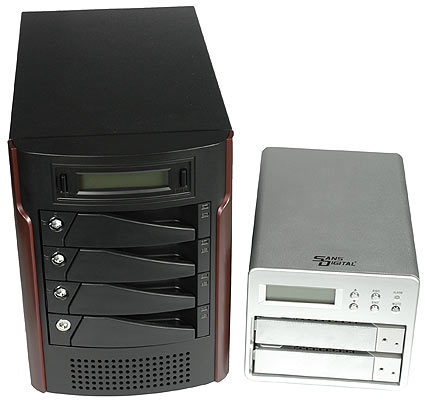RAID Boxes Run Riot
RAID Boxes: Powerful, But Noisy
Competition in the hardware industry is fierce, while storage applications continue to grow. Whether it is for a mobile phone, digital camera, MP3 player, notebook, PVR or PC, users just can't get enough storage capacity.
Storage for ultra-portable devices such as MP3 players, cell phones and smart phones typically consists of small flash memory cards. These are simple to install and easy to use, but their capacity is limited when compared to full-size flash cards or hard drives. Mid-size devices such as digital cameras utilize flash memory as well as tiny 0.8" or 1" hard drives. For notebooks and PCs, there still is no alternative to conventional hard drives. Notebooks utilize 1.8" or 2.5" disk drives; desktop PCs rely on 3.5" models with up to 750 GB.
However, hard drives have two disadvantages: First, you cannot effortless hook them up to your PC. You either have to install them into the system (or exchange the hard drive in the case of a notebook), or operate hard drives inside external storage enclosures, so they can be attached via eSATA, USB 2.0 or Firewire. Second, hard drive storage is relatively insecure. We keep preaching that hard drives are sensitive devices that have a limited life span. This is due to their nature of being technological hybrids: There are the mechanical components such as the rotating platters and the read/write heads, and there is the electronic circuitry. While semiconductors typically have a rather long life span, mechanical components wear out over time, can be easily damaged and are far from shockproof.
Everyone who cares for her or his data should never store important files on a single hard drive. Should your data drive malfunction, you can easily lose all the data on it, and data recovery is expensive. One way of dealing with this imminent danger is to do regular backups, so you will be able to recover important data in the case of a drive malfunction. The other way doesn't replace the traditional backup, but using storage appliances with built-in redundancy considerably increases data safety. We looked at two external appliances from easyRAID and Sans Digital. The easyRAID S4-FWTT supports up to four SATA hard drives, while Sans Digital's MOBILEstore MS2UT runs on two SATA drives.
Join our discussion on this topic
Get Tom's Hardware's best news and in-depth reviews, straight to your inbox.
Current page: RAID Boxes: Powerful, But Noisy
Next Page Storage Options: DAS, NAS, SAN
Patrick Schmid was the editor-in-chief for Tom's Hardware from 2005 to 2006. He wrote numerous articles on a wide range of hardware topics, including storage, CPUs, and system builds.
